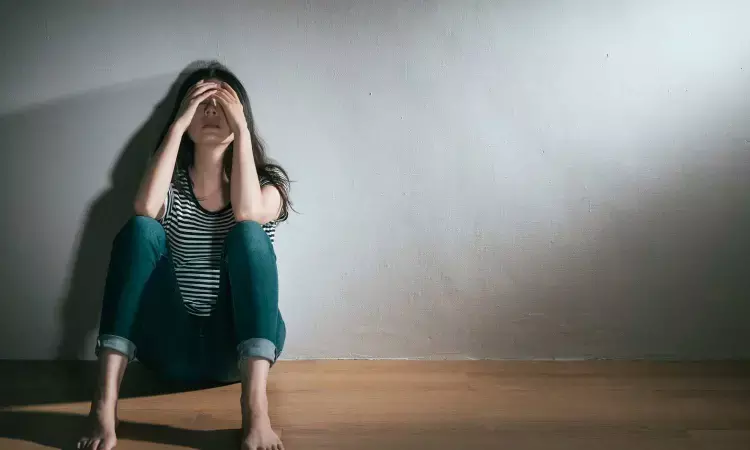- Home
- Medical news & Guidelines
- Anesthesiology
- Cardiology and CTVS
- Critical Care
- Dentistry
- Dermatology
- Diabetes and Endocrinology
- ENT
- Gastroenterology
- Medicine
- Nephrology
- Neurology
- Obstretics-Gynaecology
- Oncology
- Ophthalmology
- Orthopaedics
- Pediatrics-Neonatology
- Psychiatry
- Pulmonology
- Radiology
- Surgery
- Urology
- Laboratory Medicine
- Diet
- Nursing
- Paramedical
- Physiotherapy
- Health news
- Fact Check
- Bone Health Fact Check
- Brain Health Fact Check
- Cancer Related Fact Check
- Child Care Fact Check
- Dental and oral health fact check
- Diabetes and metabolic health fact check
- Diet and Nutrition Fact Check
- Eye and ENT Care Fact Check
- Fitness fact check
- Gut health fact check
- Heart health fact check
- Kidney health fact check
- Medical education fact check
- Men's health fact check
- Respiratory fact check
- Skin and hair care fact check
- Vaccine and Immunization fact check
- Women's health fact check
- AYUSH
- State News
- Andaman and Nicobar Islands
- Andhra Pradesh
- Arunachal Pradesh
- Assam
- Bihar
- Chandigarh
- Chattisgarh
- Dadra and Nagar Haveli
- Daman and Diu
- Delhi
- Goa
- Gujarat
- Haryana
- Himachal Pradesh
- Jammu & Kashmir
- Jharkhand
- Karnataka
- Kerala
- Ladakh
- Lakshadweep
- Madhya Pradesh
- Maharashtra
- Manipur
- Meghalaya
- Mizoram
- Nagaland
- Odisha
- Puducherry
- Punjab
- Rajasthan
- Sikkim
- Tamil Nadu
- Telangana
- Tripura
- Uttar Pradesh
- Uttrakhand
- West Bengal
- Medical Education
- Industry
Accelerated rTMS delivery safe and effective for patients with resistant depression

Australia: Accelerated repetitive transcranial magnetic stimulation (rTMS) can be offered to patients with treatment-resistant major depressive disorder (MDD), a group of clinician-researchers and neuroscientists have concluded.
The recommendations are published in a special Harvard Review of Psychiatry (HRP) issue, “Interventional Neuropsychiatry and Neuromodulation: An Emerging Subspecialty in Brain Medicine.” HRP is published in the Lippincott portfolio by Wolters Kluwer.
The group cautions that such treatment should be proposed only after a detailed discussion with patients about acceleration being an alternate form of rTMS scheduling, with documentation of informed consent.
Repetitive TMS is a noninvasive therapy in which an electromagnet delivers repeated low-intensity pulses to stimulate the brain. It has been proven safe and effective in numerous clinical trials involving patients whose MDD does not respond to antidepressant medication. Conventionally, rTMS is given once daily, 20 to 30 days over four to six weeks. That places great time demands on both patients and clinicians.
Theta burst stimulation treats MDD
The next step in development of rTMS is accelerated schedules in which patients undergo two or more sessions per day, each approximately 30 minutes long, separated by one hour or more. Although this change was just as effective in treating depression as once-daily rTMS, it created a different kind of impracticality and clinical inefficiency, according to Leo Chen, MBBS, MPsych, PhD, FRANZCP, of Monash University/Alfred Health in Melbourne, Australia, and colleagues. “These schedules required patients to attend treatment settings for long periods on each treatment day, limiting patient capacity at treatment clinics,” they note.
The time burden can be alleviated, at least in part, with a novel approach called theta-burst stimulation (TBS). The most commonly used conventional rTMS protocol delivers electromagnetic pulses at a frequency of 10 Hz, whereas TBS refers to three pulses applied at 50 Hz (gamma frequency), repeated at 5 Hz (theta frequency) intervals. Two or more TBS sessions can be delivered within an hour.
Dr. Chen and his colleagues recently published results from a multicenter randomized, controlled trial in which 10 days of TBS was compared head-to-head with a four week course of conventional rTMS. The two approaches were similar in antidepressant effect and safety. This was the largest study of accelerated TBS in depression to date.
Standardization needed
Accelerated delivery doesn’t necessarily mean accelerated response, the authors caution. Some retrospective studies have shown twice-daily rTMS induces antidepressant effects faster than once-daily administration, but the evidence is mixed. One barrier is that studies have varied widely in factors such as the stimulation target, frequency and intensity of stimulation, the duration of breaks between sessions, and the number of pulses applied per session and over a treatment course.
Importantly, though, “accelerated rTMS’s antidepressant efficacy appears comparable to conventional, once-daily rTMS protocols,” Dr. Chen’s group writes. In addition, “studies show that accelerated rTMS protocols are well-tolerated and not associated with serious adverse effects.”
“As with all therapies, the efficacy, safety, and tolerability of protocols that deviate from those investigated in clinical trials are unknown and should be cautioned against,” the researchers continue. “The durability and depression relapse patterns following accelerated rTMS remain a recognized knowledge gap.”
Reference:
Chen, Leo MBBS, MPsych, PhD, FRANZCP; Klooster, Deborah C. W. PhD; Tik, Martin MSc, PhD; Thomas, Elizabeth H. X. PhD; Downar, Jonathan MD, PhD, FRCPC; Fitzgerald, Paul B. MBBS, MPM, PhD, FRANZCP; Williams, Nolan R. MD; Baeken, Chris MD, PhD. Accelerated Repetitive Transcranial Magnetic Stimulation to Treat Major Depression: The Past, Present, and Future. Harvard Review of Psychiatry 31(3):p 142-161, 5/6 2023. | DOI: 10.1097/HRP.0000000000000364.
Dr Kamal Kant Kohli-MBBS, DTCD- a chest specialist with more than 30 years of practice and a flair for writing clinical articles, Dr Kamal Kant Kohli joined Medical Dialogues as a Chief Editor of Medical News. Besides writing articles, as an editor, he proofreads and verifies all the medical content published on Medical Dialogues including those coming from journals, studies,medical conferences,guidelines etc. Email: drkohli@medicaldialogues.in. Contact no. 011-43720751


